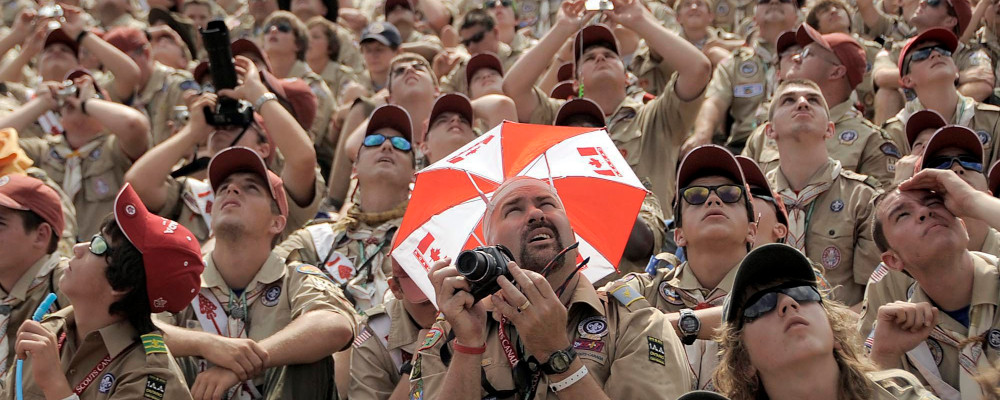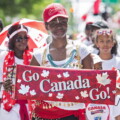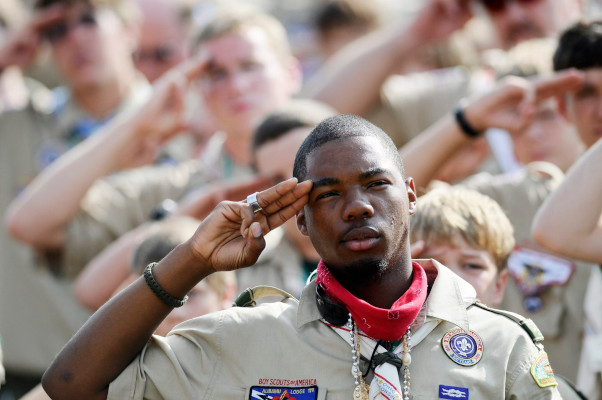This Sunday morning, at the crack of dawn, I will put on an itchy tan dress shirt covered in small colourful badges, walk up the icy hill to our local church in West Toronto, and continue a nearly 100-year-old tradition of leading a parade of eight to ten-year-olds. Boys will stand proudly holding flags adorned with a maple leaf, a beaver, the Union Jack, and a fleur-de-lis. They will be careful not to let the flags touch the ground. They will walk in unison, ensuring their shirts stay tucked in. We will give promises to the community, thank the church parishioners, and then give a cheer that will undoubtedly rattle the stained-glass windows. One boy might even bring out our old stuffed wolf’s head.
The event will mark the birthday of Lord Baden Powell, the founder of the Scouting Movement. To the layperson, it will undoubtedly seem archaic, quaint, and even odd, but the 153rd Old Mill Scouts have been doing it since 1936, I have been doing it since 1996 when I was five years old, and I think it’s part of our best hope for saving a generation of boys in crisis.

1907: Boys in Crisis
One hundred and seventeen years ago, Baden Powell witnessed an earlier crisis for boys. In the early 1900s, young men in Britain were described as “pale”, “hunched up miserable specimens smoking endless cigarettes.” Many were said to be wasting their days gambling or lazily watching sports. Malnourished, unhygienic, and stuck breathing in the toxic factory fumes, they were in great need of guidance. Baden Powell’s solution? A youth program that would invigorate this generation of young men and get them out into the countryside while teaching them outdoor skills, citizenship, resilience, discipline, fitness, patriotism, and environmentalism.
He would preface his book Scouting for Boys, which would go on to sell more than 100 million copies, writing, “[Y]ou will be fitting yourself to help your country and to be of service to other people who may be in need of help. That is what the best men are out to do.”
Baden Powell, an eccentric war hero, organized his first experimental camp on Brownsea Island, off the coast of Dorset, England, where he invited 10 lower-class boys and 10 upper-class boys to jointly pitch their tents.
The idea caught on. Today, Scouting is the largest youth movement in the world, boasting 57 million members in more than 200 countries and territories. Five million volunteers leading one million local groups across the globe play a vital role in humanitarian aid efforts and in raising the next generation.
2024: Boys in Crisis
Today’s boys are facing a crisis of their own. In 2024, many young men are feeling lost and forgotten, and are falling through society’s cracks. According to Richard Reeves, author of Of Boys and Men: Why the Modern Male Is Struggling, Why It Matters, and What to Do about It, we are witnessing a deepening malaise afflicting modern males. Economists are tracking drops in male participation in the labour force. Teachers and professors are seeing girls outperform boys in a growing number of subjects at school. Mental health experts are recording that men are far more likely to feel socially excluded than their female counterparts. Public health officials in advanced economies are watching men become three times more likely than women to take their own lives through “deaths of despair”—read: suicide and addiction. Black boys and poor boys are suffering the most. Importantly, Reeves writes, “We can hold two thoughts in our head at once. We can be passionate about women’s rights and compassionate toward vulnerable boys and men.”
But acting upon it is a different story.
Massive social and cultural shifts have left many boys dumbfounded as to what it means to be a good man in 2024. For Caitlin Moran, feminist, journalist and author of the new book What About Men?, the wakeup call was speaking to four boys from her daughter’s schools on International Women’s Day. “Men are just seen as bad, or toxic,” one boy explained to her. “We’re blamed for everything. People just automatically presume we’re all rapists.”
Moran realized, as she described it, that for her generation’s fathers, the modern new “burst of feminism” merely felt like a small and recent corrective to “10,000 years of patriarchy.” “But we don’t realize that an entire generation of boys have grown up in this time where there just hasn’t been any positive talk about being a boy,” she explained. “For a 15-year-old boy, he doesn’t know the context of patriarchy and women not having the vote and all this stuff. He just knows for all of his lifetime, there’s been a feminist club at school, and the girls are walking around feeling confident, and that no one has said anything positive about men.”
Some of these young men feel ignored by a system that makes them feel ashamed about who they are. So, they turn to men who acknowledge and celebrate them, regardless of how “toxic” they may be. Some fixate on their phones and explore the “manosphere,” where Andrew Tate orders them to reclaim their sense of primal masculinity, bulk up, buy a Rolex, and dominate their girlfriends. Or they might listen to Jordan Peterson tell them to slay their dragons and clean their damn rooms.
Other young men walk down extremist paths, letting their loneliness, self-loathing and resentment bubble up until they are calling themselves “incels” and seeking revenge against the women who ignore them. Some join street gangs, commit crimes, and murder other boys over TikTok disses. Still others board planes from Ottawa to Syria to fight what they think is a heroic masculine war under the black flag of ISIS.
We ignore these troubled young men at our own peril. And women’s peril, in particular. Without structure and purpose in their lives, without a sense of belonging and a feeling that they are part of a tribe, without healthy male role models, these aimless young men will channel their anger into destructive and even violent behaviour. As the age old saying goes, “The devil finds work for idle hands.”

Scouting at home
As a volunteer Cub Scout leader for the last four years, I see much of my role as helping to create good citizens. This year I started our first weekly meeting describing to our group of diverse young men that, while it is important to think about our own wellbeing, it is often more important that we fulfill our duty to our community. I explained that we have a stake in our neighbourhood and responsibilities to fulfill. I described how each one of us is a tiny cog in a grand neighbourhood machine that won’t run properly unless each of us does his part.
What does doing our part look like? It looks like spending weekends picking up garbage and planting trees by the nearby river. It looks like spending the holiday season delivering hundreds of presents to less fortunate children their age through the Toronto Star Santa Claus Fund. It looks like decorating cards for isolated Polish seniors in retirement homes during the height of the pandemic. It means preparing ham sandwiches for the homeless. After all, part of the promise they memorize is to “do a good turn for someone, every day.”
On the personal development front, I see our task as teaching these boys to be prepared, self-reliant, and resilient. We explain that there is, in fact, a sense of accomplishment found after pushing through struggle and discomfort. It means pulling boys away from that social media manosphere, taking advantage of Canada’s unparalleled outdoors, and teaching camping and survival skills.
Some boys are more in need of guidance than others. Many are children of divorce without father figures in the picture. Many are on the spectrum and have trouble fitting in class or on the playground. Many come from different racial backgrounds, speak different languages, and practice different religions. But all are intelligent in their own way; looking to make friends, fool around, and be boys among other boys. That is not to say we don’t have some impressive female Cubs as well. In fact, they are some of our keenest members. And it is essential that the boys learn how to treat them with respect.
Our group has been operating in the same community and out of the same church for 88 years. History and traditions are important. These boys need to know that they are not singular beings floating aimlessly through the world. They have roots. I tell them they are brothers with the Scouts who gave their lives during the Warsaw Uprising and the Scouts that have been recently helping Ukrainian refugees find shelter. I remind them they are the descendants of Scouts who cleaned up the rubble after Hurricane Hazel swept through our neighbourhood killing residents in 1954. This Remembrance Day, we organized a visit from a 100-year-old Canadian veteran named Merfyn David. After hearing about how he liberated France and Holland from the Nazis, we discovered he was actually once a member of our 153rd Old Mill Scout group. Little jaws hit the floor. Each year, I show the boys the official charter that announced the founding of our group. They get it. When they return the old framed parchment to its place in our cupboard, they handle it with care.
The history of Scouts of course has its scars. Sick criminals have sought out our movement and abused it and sexually abused its youth. Our American cousins, the Boy Scouts of America, did not have sufficient safeguards in place to stop this behaviour in its tracks. They are now literally paying the price through a $2.46 billion dollar settlement with victims. In Canada, there were a number of cases where police were not informed properly about allegations. It is stomach churning that a program meant to enrich the lives of boys has ruined some boys’ lives. Since the 1990s, Scouts have responded with third party audits and tripled down on background checks and other security measures.
After all is said and done, I believe Scouting has introduced overwhelmingly more good into young peoples’ lives than bad. Canada, as a whole, is better off with it having existed and continuing to exist.
Some of our leaders, like myself, my father, and my colleagues, have gone through the entire program, having signed up as children. Today, we are adults with careers and families paying our dues to an organization to which we owe so much. While our group is smaller than it once was, I like to think we are part of an endless chain, and that one day my own sons or daughters will get from Scouting some of what it gave to me.
On January 8, 1941, at the age of 83, Lord Baden Powell, the founder of the Scouting Movement, died. He insisted on being laid to rest in Africa, in a town called Nyeri, at the foot of Mount Kenya. While a statue of Baden Powell in Dorset, England (the site of that first Scout camp) was recently removed for safekeeping after protestors put it on their “Topple the Racist” hitlist, the British imperialist’s gravesite is thoughtfully protected by devoted and thankful Black Kenyan Scouts, a striking example for history’s complexity.
Before he passed, Baden Powell wrote a farewell letter to Scouts, to be released after his death. He told us that, “[T]he real way to get happiness is by giving out happiness to other people. Try and leave this world a little better than you found it and when your turn comes to die, you can die happy in feeling that at any rate you have not wasted your time but have done your best,” he wrote. “[S]tick to your Scout promise always—even after you have ceased to be a boy.” It is a message I will take with me and tell this young generation of boys when I lead Sunday’s flag parade.
Recommended for You

‘You have to meet bullying with counter-bullying’: David Frum on how Canada can push back against Trump’s trade negotiation tactics

‘I want to make Canada a freer country’: Conservative MP Andrew Lawton talks being a newbie in Parliament, patriotism, and Pierre Poilievre’s strategy

Howard Anglin: Lament for a Lament

‘A place where anybody, from anywhere, can do anything’: The Hub celebrates Canada Day




